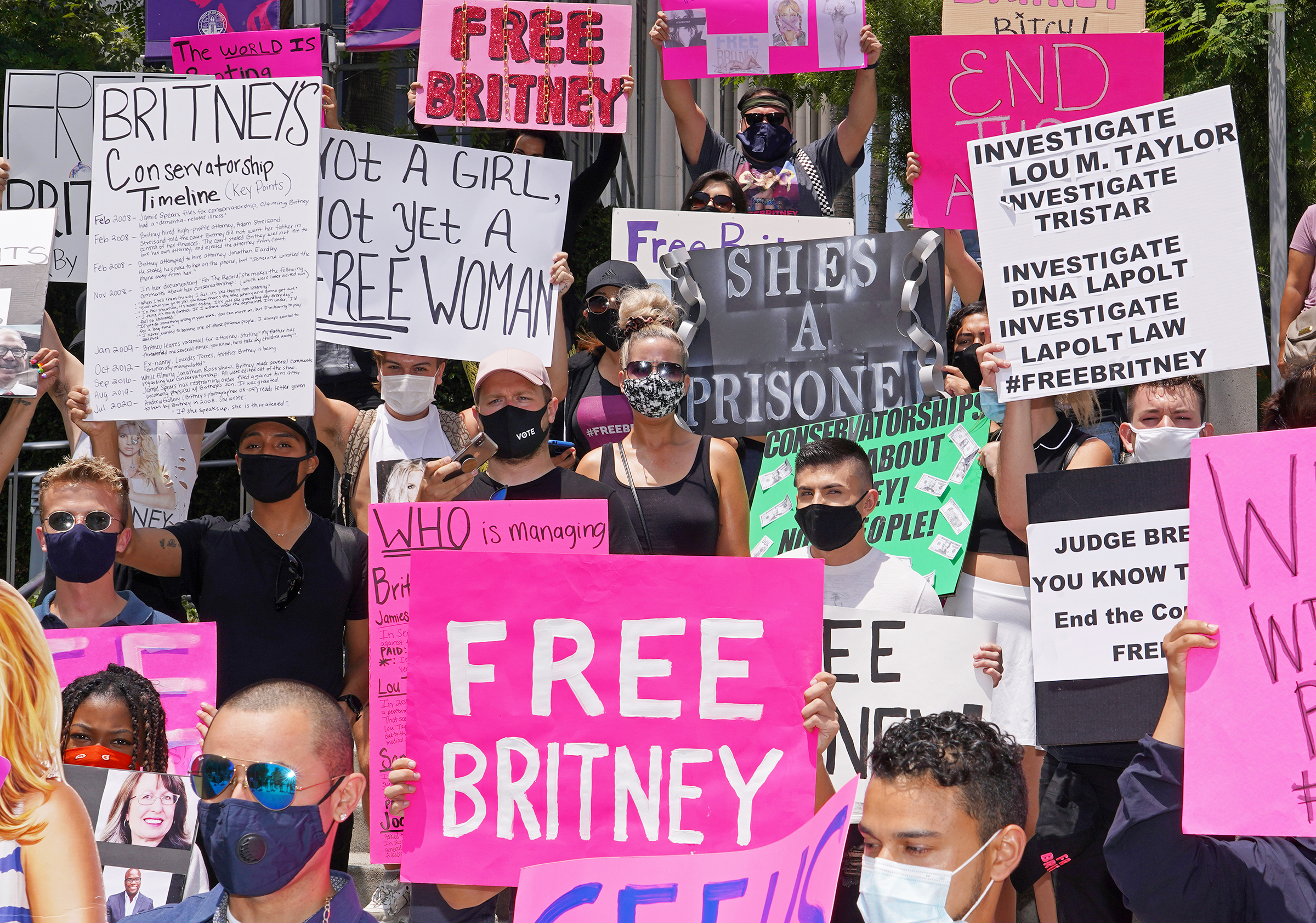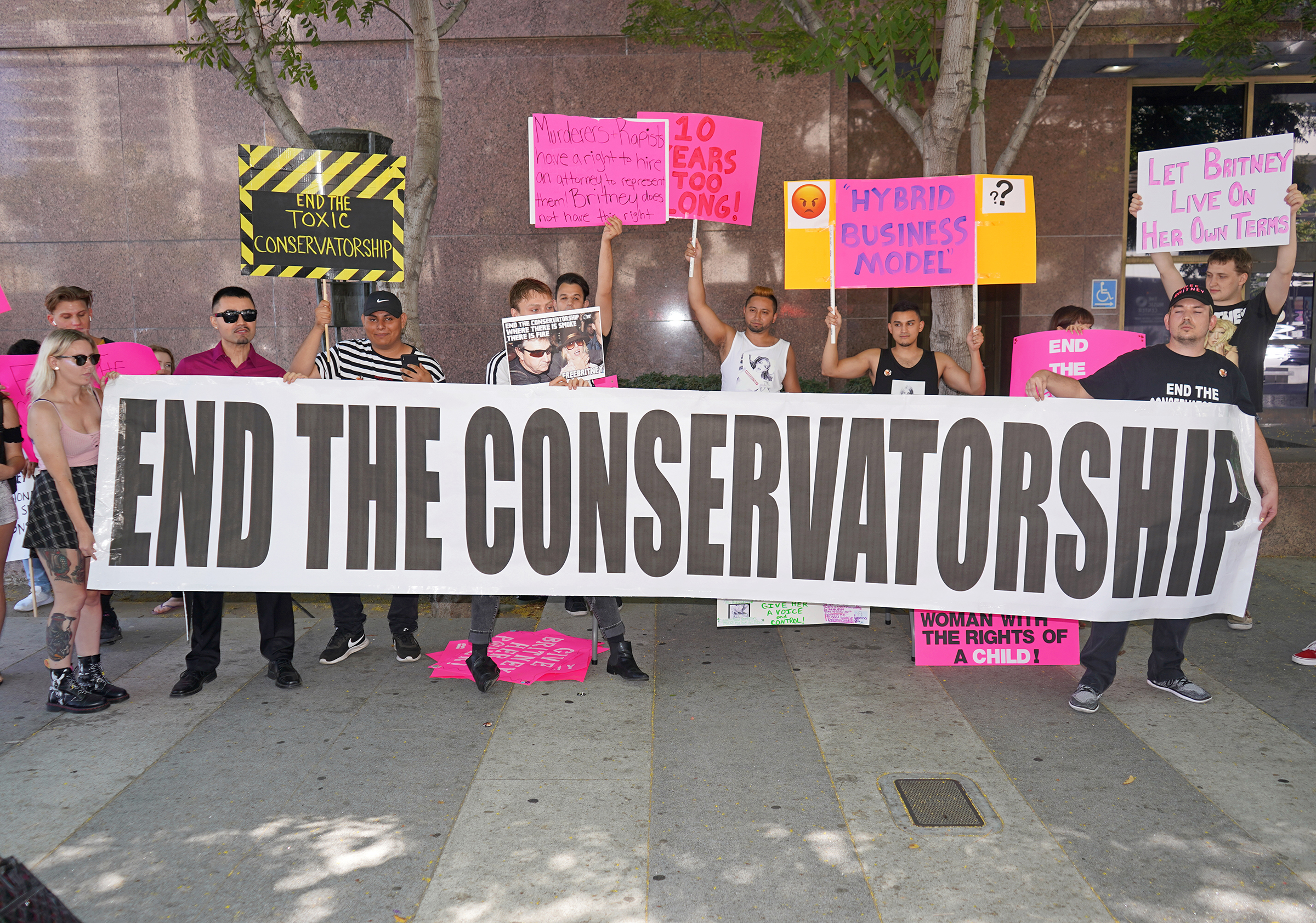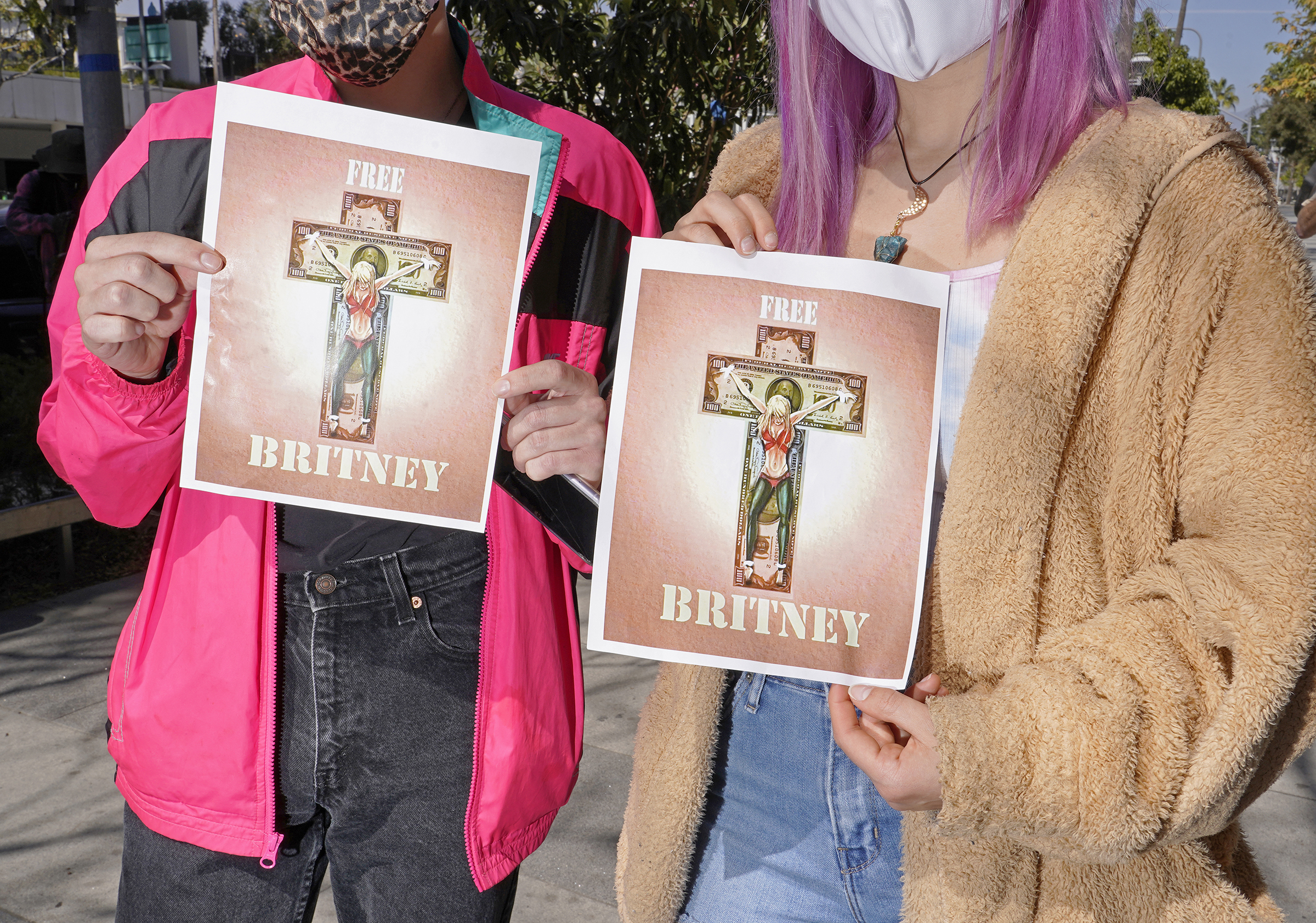Britney Spears fans have been rallying under the #FreeBritney banner for years. But for a very long time, it was hard to tell how much freedom Britney really wanted.
On Wednesday, Spears delivered bracingly candid and emotional remarks about her ongoing case to Los Angeles Superior Court Judge Brenda Penny. Addressing an open court for the first time, from a remote location, the singer—who, at 39, has now been under conservatorship for a third of her life—stated in no uncertain terms that she wanted that arrangement, which she described as “abusive,” to end immediately. She compared her existence to that of a sex trafficking victim, claiming that she was being prevented from choosing her own legal representation, seeing sober friends, marrying her boyfriend Sam Asghari and getting an IUD removed so that the couple could have a baby. And she said that, after the way they had treated her, “my dad and anyone involved in this conservatorship and my management who played a key role in punishing me… should be in jail.”

“I’ve lied and told the whole world I’m OK and I’m happy,” Spears, who often posts upbeat messages to social media, confessed to the court. “I’ve been in denial. I’ve been in shock. I am traumatized…. I’m not happy. I can’t sleep. I’m so angry. It’s insane. And I’m depressed. I cry every day.”
The hearing came just a day after a bombshell New York Times story revealed that Spears had raised multiple objections over the years to the terms of a conservatorship that, according to the singer, “restricted everything from whom she dated to the color of her kitchen cabinets.” Citing confidential court records that date back to 2014, reporters Liz Day, Samantha Stark and Joe Coscarelli write that Spears disputed her father Jamie Spears’ suitability for the role of conservator; complained to an investigator that she was “sick of being taken advantage of” by her employees; and alleged that she’d been forced to both perform and check into a mental health facility.
Read more: What to Know About Britney Spears, Her Conservatorship and the #FreeBritney Movement
Spears was placed under her father’s conservatorship following a series of apparent mental health emergencies in 2008. While there have been several shifts in personnel in the intervening years, the urgency of the situation seems to have intensified since January 2019, when the singer abruptly canceled a Las Vegas residency and announced an “indefinite work hiatus.”
That September, Jamie Spears temporarily relinquished his role in his daughter’s affairs due to health issues. The plot has thickened considerably since then, with Spears’ mother Lynne Spears among the many who’ve weighed in on her future. Finally, on April 27, Los Angeles Superior Court Judge Brenda Perry agreed to let Spears speak on her own behalf at a subsequent hearing: the one that took place today.

Meanwhile, in February, FX’s Framing Britney Spears brought a surge of support for the #FreeBritney movement. While Tuesday’s report contains more new information, the feature doc, also produced by the Times, effectively summarizes a saga that dates back to the late ’90s, from the ridicule and objectification Spears endured as a teenage pop star to the restricted life she currently lives as a grown-up artist, mom and multimillionaire deprived of the legal power to make even the most basic decisions for herself.
Through interviews with journalists, activist fans and people who’ve worked with the star and her family, Stark, who directed the film, suggests that so many years of character assassination, paparazzi stalking and other horrors perpetuated by the tabloid press made the deterioration of her subject’s mental health inevitable—and that those whose stepped in, supposedly to help, didn’t necessarily have Spears’ best interests at heart.
This isn’t a mind-blowing argument. Particularly after #MeToo, which raised popular awareness (or dispelled popular denial) of the rampant sexual misconduct and generalized misogyny women in the entertainment industry tend to endure, the conclusion that Spears has been a victim of trial by media was probably obvious to anyone who bothered to think much about her predicament. But Stark’s film did emerge at a moment when it seemed as though fan fury over the singer’s disenfranchisement might actually have a bearing on her fate. Whether this coalition of strangers—one whose intentions were undoubtedly benevolent—knew better than anyone in Spears’ inner circle what was best for her remained an open question.
In March, a caption accompanying an Instagram video of Spears dancing to Aerosmith’s “Crazy” alluded to Framing (“I didn’t watch the documentary but from what I did see of it I was embarrassed by the light they put me in”) and lamented that she had been “watched… and judged really my whole life.” Yet her situation was so opaque that it was impossible to know whether she was objecting solely to the film or to publicity of any nature—or even whether she had written the caption herself, as a genuine expression of her sentiments. Even the most sympathetic observers had to acknowledge the possibility that our perspectives on the star’s life, removed as they were from her daily reality, might not be the most accurate ones.

Of course, there’s still plenty we don’t know. But now, with the proverbial whole world watching, Spears has confirmed that she is desperately unhappy living under conservatorship and has disavowed any previous statements to the contrary. That certainly vindicates Stark and, more broadly, a new generation of journalists who’ve pushed back on past depictions of the singer as trashy, slutty and dangerously unstable. Lest we in the media be too quick to congratulate ourselves for correcting past wrongs—efforts that may turn out to be too little, too late—it’s important to acknowledge that it was the fans who got this story right first. Fans who were mocked, year after year, for combing her social accounts for distress signals and for forming a movement to liberate a woman who’s sold millions of records and for begging her bullies to “leave Britney alone.”
Out of all the crushing things Spears said in court on Wednesday, for me, the most heartbreaking was her explanation of why she didn’t speak out earlier: “I honestly don’t think anyone would believe me… That’s why I didn’t want to say any of this to anybody, to the public. People would make fun of me or laugh at me and say, ‘She’s lying, she’s got everything, she’s Britney Spears.’” Who could blame her? To a great extent, it was her misrepresentation in the public sphere that put her in this place. And we still don’t know what the outcome of this pivotal moment will be. What’s clear is that if Britney ever wins her freedom, it will be thanks to those who insisted on hearing a woman who’d been silenced.
More Must-Reads from TIME
- Caitlin Clark Is TIME's 2024 Athlete of the Year
- Where Trump 2.0 Will Differ From 1.0
- Is Intermittent Fasting Good or Bad for You?
- The 100 Must-Read Books of 2024
- Column: If Optimism Feels Ridiculous Now, Try Hope
- The Future of Climate Action Is Trade Policy
- FX’s Say Nothing Is the Must-Watch Political Thriller of 2024
- Merle Bombardieri Is Helping People Make the Baby Decision
Contact us at letters@time.com